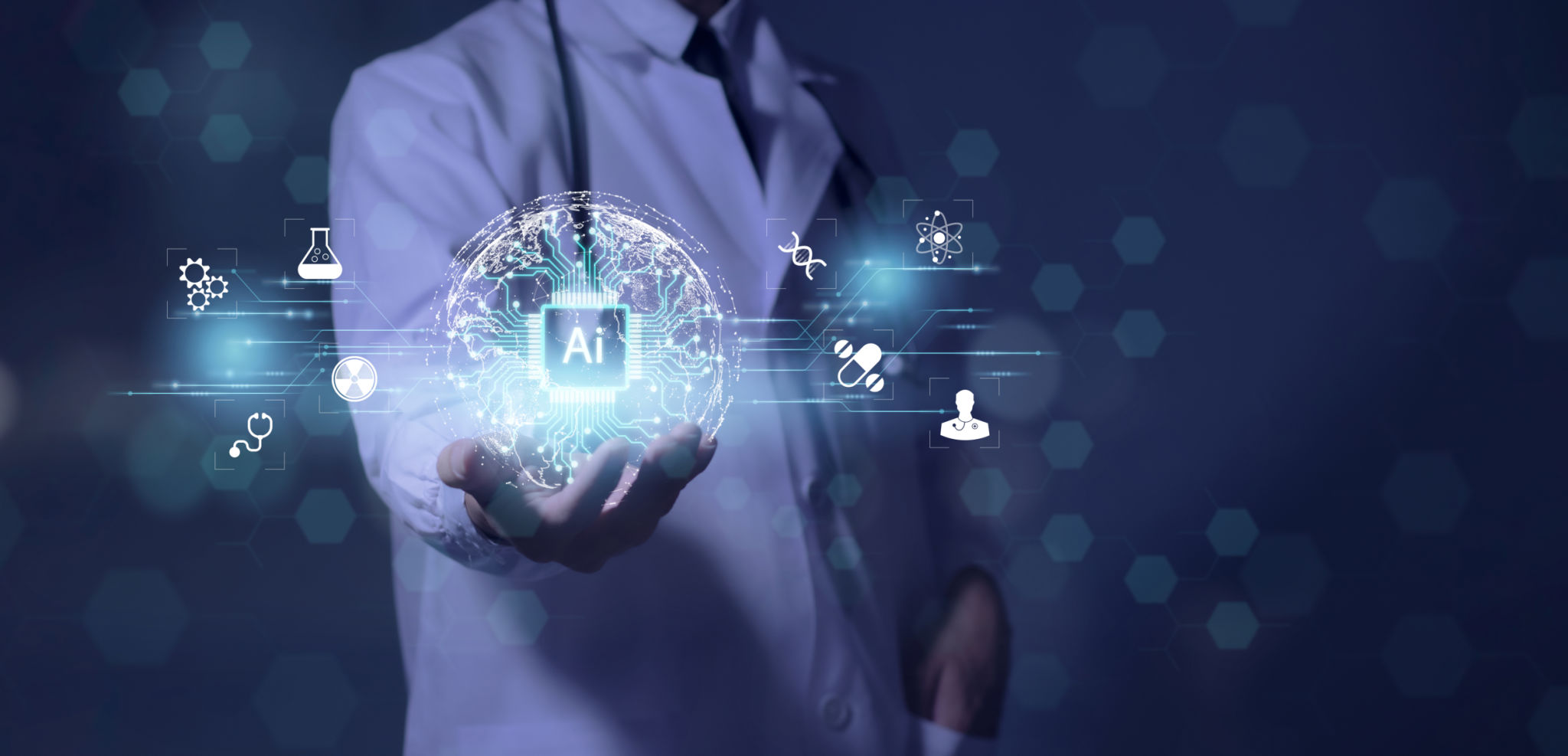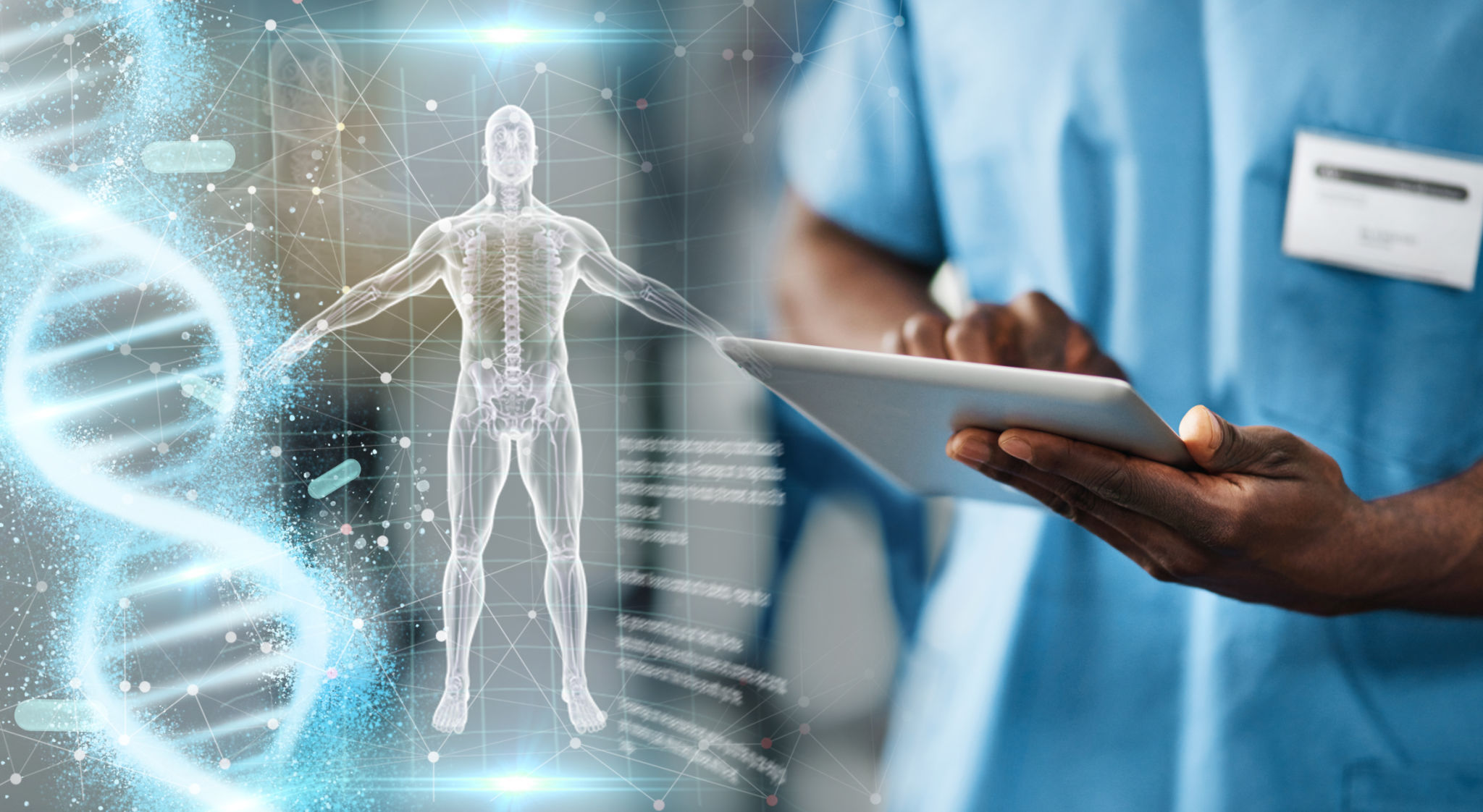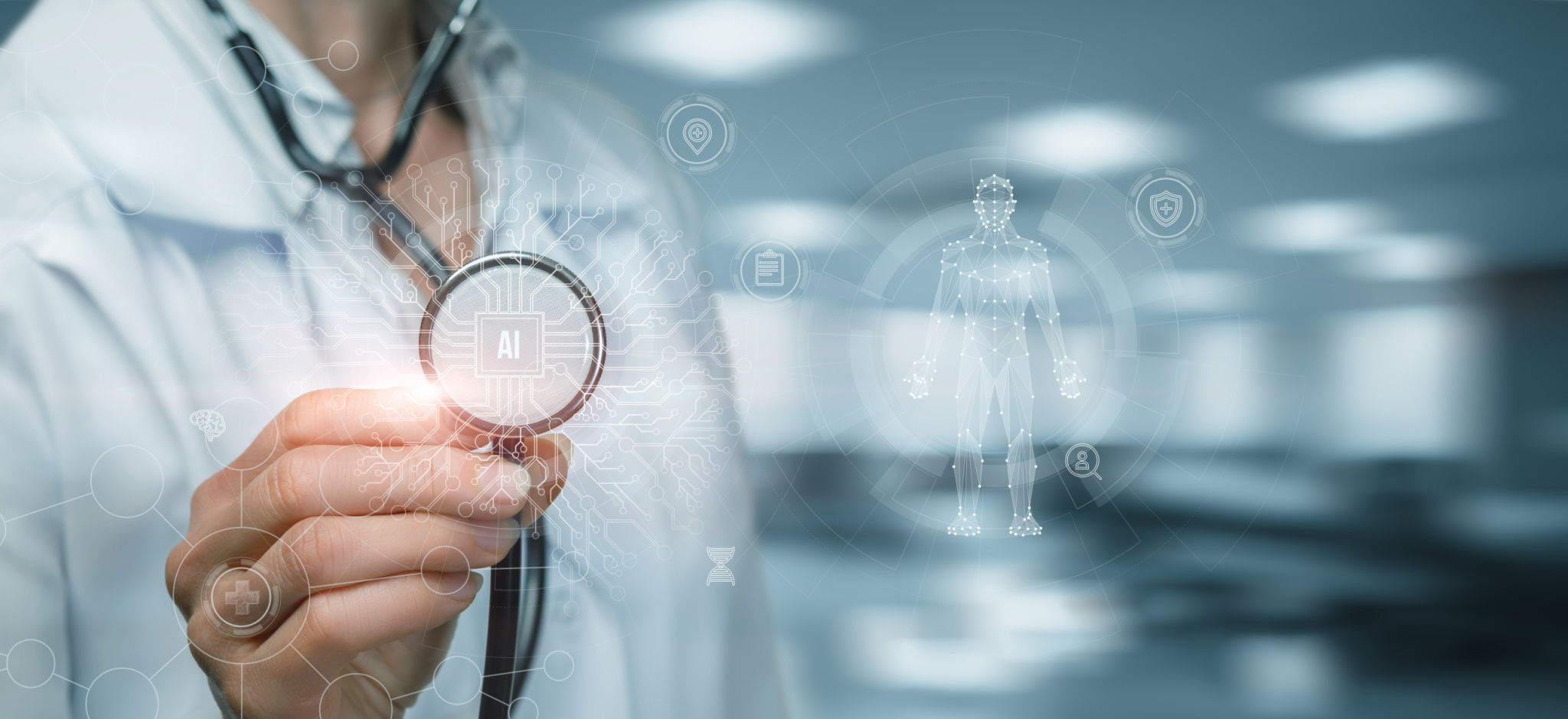How AI is Impacting Healthcare
JH
Artificial Intelligence (AI) is rapidly transforming the landscape of healthcare, from the way we diagnose diseases to how we deliver care and manage health systems. Around 4.5 billion people lack access to essential health services, and a global shortage of 11 million health workers is projected by 2030. AI has the potential to help bridge this gap and revolutionize global healthcare, enhancing the reach and efficiency of medical services even in underserved areas. In the words of the World Health Organization’s Director-General, AI is already playing a role in diagnosis, clinical care, drug development, disease surveillance, outbreak response, and health system management, heralding that “the future of healthcare is digital”. Experts concur that AI-based devices and algorithms will play a major role across preventive, diagnostic, and therapeutic interventions in medicine. This article explores how AI is impacting healthcare today – from improving diagnostics and treatment to empowering patients and public health – while also considering the challenges ahead.

AI-Enhanced Diagnostics and Early Detection
One of the most significant impacts of AI in healthcare is in medical diagnostics. AI systems can analyze medical images (like X-rays, CT scans, and MRIs) and laboratory results with remarkable accuracy and speed. In fact, AI tools have demonstrated performance on par with or even exceeding that of human specialists in fields such as radiology and pathology. For example, an AI software for stroke analysis was found to be twice as accurate as professionals at interpreting brain scans of stroke patients . Such precision not only improves diagnostic confidence but also saves critical time in emergencies. AI is also helping to catch what humans might miss – urgent care doctors can miss up to 10% of fractures on X- rays, but using AI to assist in initial scans can avoid missed fractures and unnecessary imaging, with trials finding these tools reliable and safe for clinical use.
Beyond imaging, AI’s pattern-recognition capabilities enable earlier detection of diseases. Advanced machine learning models can sift through complex health data to spot subtle indicators of illness long before symptoms surface. A notable example is a recent AI model that could detect early signs of over 1,000 diseases – predicting with high confidence a future diagnosis years before the patient is even aware of any symptoms. Such early warning systems, applied to conditions from Alzheimer’s to cancers, promise to shift healthcare from reactive treatment to proactive prevention. Likewise, AI-driven analytics in hospitals are being used to monitor patients’ vital signs and laboratory values in real time; in intensive care units, AI can predict life-threatening events like sepsis hours before they would otherwise be recognized, allowing clinicians to intervene sooner. By enhancing the accuracy and timing of diagnoses, AI is enabling more personalized and effective treatments, often improving patient outcomes.
Enhancing Patient Care and Treatment
AI is not only changing what we detect, but also how we decide and deliver treatments. In clinical practice, AI-powered decision support systems help physicians sort through vast medical knowledge and patient data to recommend optimal treatment plans. For instance, AI can integrate a patient’s symptoms, history, and even genomic information to suggest personalized treatment options that a clinician might not have immediately considered. In fact, AI-driven personalized treatment plans can complement traditional medical approaches by tailoring care to the individual’s characteristics, which improves
outcomes and can reduce trial-and-error in therapies. Some hospitals are experimenting with AI- assisted clinical chatbots that triage patients or answer routine queries, helping to lighten the load on healthcare staff. While early versions of such chatbots (based on standard large language models) have limitations, new approaches that combine AI with medical databases have shown promise in providing relevant, evidence-based answers to clinicians’ questions in testing. This indicates a future where AI might aid doctors in making faster, well-informed decisions at the point of care.
AI is also streamlining healthcare operations. In many health systems, administrative tasks like patient scheduling, billing, and managing electronic health records are labor-intensive and prone to delays. AI excels at automating and optimizing these processes. According to the European Commission, AI can reduce costs and streamline administrative tasks – for example, automatically scheduling patient appointments based on urgency and resource availability – thereby freeing healthcare workers to focus more on direct patient care. In hospitals, predictive algorithms are being used to forecast patient admissions and staffing needs, ensuring that the right resources (beds, equipment, and personnel) are available at the right time. This operational efficiency not only cuts waste and waiting times but also improves the quality of care by minimizing bottlenecks. Even in acute care scenarios, AI is proving its worth: ambulance services have tested AI models that help paramedics decide which patients truly need hospital transport. In the UK, one AI system could correctly predict 80% of the cases that required ambulance transport to the hospital, reducing unnecessary strain on emergency rooms. From the emergency response to inpatient management, AI augments human decision-making, helping deliver the right care at the right time.

Preventive Care and Personalized Wellness
Perhaps one of the most exciting impacts of AI in healthcare is the shift toward preventive care and personalized wellness. Instead of waiting for illness to occur, AI enables continuous monitoring and early intervention to keep people healthier. The proliferation of health wearables and mobile apps – from fitness trackers and smartwatches to blood glucose monitors – means an avalanche of personal health data is now available. AI algorithms can analyze this data in real time, flagging anomalies and health risks before they escalate. For example, smartphone apps can continuously track heart rate, sleep patterns, or respiratory rate and alert users (or their doctors) to potential issues like arrhythmias or breathing difficulties. This empowers individuals to take charge of their health on a daily basis.
Startup innovators are at the forefront of leveraging AI for wellness. Xcellent Life, for instance, provides an AI-driven digital health platform that offers comprehensive real-time health analytics and personalized insights to users. Using its proprietary Real-Time Human Diagnostics (RtHD) technology, Xcellent Life’s platform continuously monitors a wide range of health indicators and applies AI to detect meaningful patterns. This means it can give early warnings for potential health issues and recommend lifestyle adjustments or preventive measures tailored to each person. By gamifying wellness through a rewards system (what Xcellent Life calls “Wellness-as-a-Currency”), the platform also incentivizes healthy behavior, turning healthy habits into tangible rewards. This innovative approach addresses one of the core challenges in public health: encouraging sustained healthy lifestyles. As Xcellent Life’s mission statement puts it, their AI-empowered software aims to drive a proactive approach to health, leveraging comprehensive data and incentives to improve wellness, avoid risks, and reduce overall healthcare costs. Such AI-based tools exemplify how healthcare is moving beyond the clinic and into the hands of individuals, enabling personalized wellness management at scale.
The benefits of preventive, AI-guided care extend not only to individuals but also to healthcare systems at large. By catching problems early or preventing them altogether, these approaches can significantly cut costs associated with advanced disease treatment. A study by the IQVIA Institute for Human Data Science estimated that consumer health apps and wearables could save the US healthcare system about $7 billion annually in preventive care and reduced hospital visits. Thus, AI’s impact on healthcare includes not just better outcomes for patients, but also economic gains through a healthier population. When people use AI-powered tools to stay healthy, everyone wins – individuals enjoy a higher quality of life, employers see more productivity, and society faces lower healthcare expenditures.
Public Health and Global Impact
On a population level, AI is becoming an indispensable tool in public health. Health agencies and organizations are using AI to monitor, predict, and respond to disease outbreaks and other health threats faster than ever before. For example, the U.S. Centers for Disease Control and Prevention (CDC) has applied machine learning to improve epidemiological surveillance. In one project, the CDC developed an AI system that can automatically detect signs of tuberculosis on chest X-rays, significantly speeding up what used to be a time-consuming diagnostic process in surveillance programs. AI-based models can analyze vast amounts of health data, including lab reports, social media trends, and environmental data, to spot unusual patterns that might indicate an emerging outbreak. In fact, health authorities are increasingly exploring AI to forecast disease spread: by analyzing diverse datasets (from climate conditions to population mobility), AI can help predict outbreaks and guide timely public health interventions. Early warning of a flu outbreak or a dengue surge, for instance, allows resources to be mobilized and prevention campaigns to start sooner, potentially saving lives.
AI also played a role in the COVID-19 pandemic response, where data science teams used AI tools to track the virus’s spread and even to accelerate vaccine development. Natural language processing (NLP) algorithms were used to sift through massive volumes of vaccine safety reports and social media posts to quickly identify potential side effects of COVID-19 vaccines, augmenting traditional reporting systems. In another innovative application, the CDC used AI with satellite imagery: a system called TowerScout automatically scanned aerial images to locate cooling towers that could harbor Legionella bacteria (which causes Legionnaires’ disease), thereby helping target inspections and prevent outbreaks. These examples illustrate how AI can enhance the speed and precision of public health efforts – from faster contact tracing to smarter allocation of medical supplies during a crisis. On a global scale, organizations like WHO are championing AI as a means to strengthen health systems in low-resource settings, by supporting projects that use AI for tasks like diagnosing disease in remote areas and managing health data efficiently. The net effect is a more responsive and equitable public health infrastructure, where data-driven insights guide actions to protect communities.
Accelerating Research and Drug Discovery
AI’s impact on healthcare is also profoundly felt in medical research and drug development. The process of bringing a new drug from lab to market is notoriously lengthy and costly – often taking years and billions of dollars. AI is helping to shorten this timeline by tackling some of the most complex research challenges. In drug discovery, AI algorithms can analyze enormous chemical and genomic datasets to identify promising drug candidates much faster than traditional methods. They can predict which molecules are most likely to bind to a target protein or which compounds might have undesirable side effects, focusing researchers’ attention on the most viable options. According to the European Commission, AI is now being employed across the entire lifecycle of medicines, from identifying new therapeutic targets, optimizing drug design, to streamlining clinical trials and even enhancing pharmacovigilance (drug safety monitoring) after approval. For example, during clinical development, AI can assist in patient stratification – finding the right patients for trials – and in creating “digital twins” to simulate trials, which helps in predicting outcomes and refining trial protocols . These capabilities reduce the likelihood of failure in expensive late-stage trials and help get effective treatments to patients sooner.
Researchers are also using AI to mine scientific literature and databases at an unprecedented scale, uncovering new insights. A noteworthy success story is how AI-powered protein folding predictions (like DeepMind’s AlphaFold) have solved structures of proteins that were difficult to crack, potentially opening new pathways for drug discovery. In the realm of personalized medicine, AI can combine data from genomics and clinical records to identify which subsets of patients might benefit most from a particular drug – making precision medicine a practical reality. All these applications contribute to faster, more efficient research breakthroughs. As a result, the pipeline from bench to bedside is being accelerated: what once took decades might be achievable in a few years with AI’s help, bringing hope for faster cures to diseases like cancer, Alzheimer’s, and rare genetic disorders. By reducing research costs and timelines, AI not only hastens innovation but could also lower the costs of new therapies in the long run.
Challenges and Future Outlook
While the impact of AI on healthcare is overwhelmingly positive, it comes with critical challenges and considerations. Integrating AI into healthcare workflows requires building trust among clinicians and patients. Medical decisions can be life-and-death, so AI systems must be thoroughly validated for safety, accuracy, and fairness. Ensuring high-quality data is central to this effort – AI models trained on biased or poor-quality data can produce biased or unreliable results, potentially exacerbating health disparities. As noted by CDC researchers, enthusiasm for AI’s potential is tempered by concerns about data quality, transparency of AI algorithms, and evidence of clinical utility. AI models are often “black boxes,” making it hard for users to understand how they arrive at a recommendation. This lack of transparency can hinder trust; therefore, developers are focusing on explainable AI in healthcare so that clinicians can interpret and verify AI suggestions. Additionally, protecting patient privacy is paramount. AI thrives on data, but using sensitive health data raises ethical issues about consent and confidentiality. Strict data governance and security measures are needed to prevent misuse of personal health information.
Regulators and policymakers are beginning to establish guidelines for AI in healthcare. For example, the European Union’s new AI Act will enforce requirements for high-risk AI systems (including medical AI) to ensure they meet standards for risk mitigation, unbiased data sets, and human oversight. Such regulations aim to provide guardrails so that innovation can proceed without compromising patient safety or rights. Healthcare professionals also emphasize that AI should augment, not replace, human providers – the technology works best as a tool in the hands of doctors and public health officials, rather than an autonomous decision-maker. Training and education are important so that users of AI understand its limitations and can interpret its outputs correctly. Despite these challenges, the trajectory of AI in healthcare is clearly forward. Global health leaders are optimistic that with the right frameworks, AI’s benefits can be harnessed widely and equitably. “I believe we can have all the potential that AI offers us and have the guardrails in place,” said the EU’s health commissioner in a recent forum, underscoring the need for balance between innovation and regulation.
Looking ahead, the future of healthcare powered by AI appears incredibly promising. From large international agencies to agile startups, many stakeholders are working to ensure AI-driven health solutions are effective, ethical, and accessible. The World Health Organization envisions AI as a powerful force for innovation, equity, and ethical integrity in healthcare, and its goal is to bring AI innovations to all communities so that health services become smarter and more inclusive companies like Xcellent Life and others will continue to drive creative AI applications that empower both patients and providers. If we can navigate the challenges thoughtfully, AI may well usher in a new era of medicine – one where preventive, personalized, and precise healthcare becomes the norm, and where quality care is delivered universally. The journey is just beginning, but the impact of AI on healthcare is already profound, and its potential to improve human health in the years to come is nothing short of extraordinary.

Sources:
6 ways AI is transforming healthcare | World Economic Forum
https://www.weforum.org/stories/2025/03/ai-transforming-global-health/
Harnessing artificial intelligence for health
https://www.who.int/teams/digital-health-and-innovation/harnessing-artificial-intelligence-for-health
Artificial Intelligence in Medicine and Public Health: Prospects and Challenges Beyond the Pandemic | Blogs | CDC
https://blogs.cdc.gov/genomics/2022/03/01/artificial-intelligence-2/
4 ways AI is transforming healthcare
https://www.gavi.org/vaccineswork/4-ways-ai-transforming-healthcare
Artificial Intelligence in healthcare - European Commission
https://health.ec.europa.eu/ehealth-digital-health-and-care/artificial-intelligence-healthcare_en
Xcellent Life | The Most Complete Digital Health Platform
https://xcellentlife.com/
7 Ways AI And Quantum Computing Can Transform Healthcare And Humanity | Xcellent Life
https://xcellentlife.com/7-ways-ai-and-quantum-computing-can-transform-healthcare-and-humanity/
Artificial Intelligence and Machine Learning | Technologies | CDC
https://www.cdc.gov/surveillance/data-modernization/technologies/ai-ml.html
